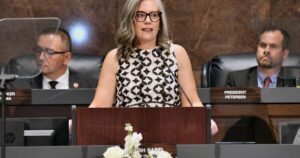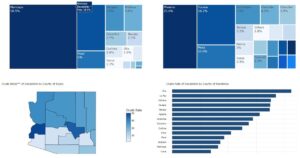Montana Legislature Prepares for Education Reforms Amidst Ongoing Challenges
As the Montana Legislature convenes, education is at the forefront of discussions, highlighting the need for a comprehensive approach to several pressing issues. Among the key topics are the potential establishment of a teacher bill of rights, the persistent struggle with starting teacher pay, and the funding requirements for English Language Learners (ELL).
In anticipation of the legislative session, Democratic lawmakers have shared their educational priorities, while Republicans have pinpointed issues expected to be debated. Rep. Connie Keogh, a Democrat from Missoula, emphasized the importance of the statutory study on school funding, which takes place every five years. This study will examine the educational needs and costs associated with Montana’s public education system, as outlined in a report from the Legislative Services Division.
Both parties agree that raising starting teacher pay remains a critical issue. In June 2024, it was reported that the Office of Public Instruction mishandled a key program intended to enhance teacher salaries, part of the 2023 TEACH Act. Despite the initiative, only around half of Montana’s school districts utilized the program in the fiscal year 2025.
Rep. David Bedey, a Republican from Hamilton, anticipates a legislative push centered on a bill to address starting teacher pay, viewing it as a “centerpiece” of education reform. The forthcoming STARS Act, introduced by Rep. Llew Jones, aims to address inflation-related gaps in education funding. Yet, Keogh noted that while the STARS Act is a step forward, it primarily benefits the lowest-paid teachers without adequately supporting those mid- or late-career.
Attention is also being directed toward funding for ELL students, a group whose numbers have significantly increased. Keogh pointed out that Montana is unique in not funding ELL programs on a per-student basis, relying instead on Title III of the Elementary and Secondary Education Act for supplemental services. As EducationWeek explains, these grants are minimal compared to the actual needs.
Rep. Melissa Romano highlighted that Democratic education bills will likely focus on enhancing K-12 funding, supporting educators and students, and improving educator recruitment and retention. She also noted that Rep. Eric Matthews would propose a teacher bill of rights to safeguard teachers from adverse actions.
During the 2023 session, legislation to expand public charter schools was well-received, prompting more proposals than anticipated. Bedey expressed optimism about the charter school program but stressed the need for sustainable funding. Montana must balance its budget, unlike federal practices.
Funding public schools remains a critical issue, especially with the Republican majority in the legislature not as dominant as in previous years. According to the Montana Constitution, the state must fund public schools, a task complicated by the reliance on property taxes. Residential taxpayers have seen a significant increase in their tax burden, now accounting for 59% of the property tax bill.
Governor Greg Gianforte’s property tax task force has proposed several measures for the legislature to consider, aiming to balance taxes between different districts and introduce requirements for mill levy elections. These recommendations seek to address the disparities affecting school funding.






